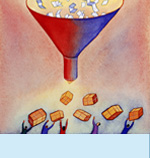


  |
||||
| PRINTER FRIENDLY VERSION
Can You Be "Kind of Ethical"? What Would You Do in These Three Real Life Examples?
The compliment was unexpected and powerful: Wow, Jenny. I think of you as the most honest and upstanding person I know. If you think something isn't a good idea ethically, then it must be a really bad move. A colleague had asked my opinion about a business decision and I'd advised against it, pointing out a conflict of interest. The decision seemed straight-forward enough to me, but I was struck — and humbled — by her response. And it got me thinking. About how an ethical approach to doing business — and one's reputation as an ethical person — doesn't develop overnight. It builds, one step after another, until all of a sudden you have developed your own personal sense of ethics and the reputation that accompanies that approach. Just the way it's not really possible to be "kind of pregnant," it's not really possible to be "kind of ethical." Either you are — or you aren't. Your Career, Your Ethics, Your Reputation While the widely-known ethics breaches certainly get the most attention — the Enrons and Bernie Madoffs of the world — they aren't the most common. The most common ethical decisions are the ones we face every day. Oftentimes, they might seem relatively minor; however, they result in the formation of our own personal sense of ethics and ultimately lead to our reputation. Making ethical decisions and gaining a reputation as an ethical person builds slowly over one's career. It begins the day you start your first job and are confronted with situations and decisions. You don't always realize that you're confronted with an ethics breach. It's not like something in the movies. It might work like this: Something is said or done, and you get a bad feeling in the pit of your stomach that you either heed or ignore. But if you ignore it, you may very well find yourself in a subsequent, similar situation and that time, it will be just a little bit easier to look the other way. Real-Life Example #1: I'll never forget one of the first meetings I attended as a very young account executive for a PR firm. Our client asked why we were recommending conducting an event in Boston and my supervisor replied, "Research has shown that Boston is a trend-setting city." Our client readily agreed to proceed with our recommendations. Afterward, my supervisor said to me, "I totally made that up." What Would You Do? Have you ever had a manager represent your work in a way that made you uncomfortable? Did the fact that the misrepresentation led to increased business make the situation feel more complicated? How did you handle the situation? Did you do anything about it? What Actually Happened: After a few more situations similar to the one described above, I requested and received a change of supervisors. I actually liked my supervisor and loved the accounts on which we worked, but his behavior was giving me a very bad feeling in the pit of my stomach. Real-Life Example #2: Lying to the CEO A Marketing colleague tells of seeing her manager at a corporate lunch program that involved treating employees to pizza followed by an educational speaker. "Who's speaking today?" she asked her boss. "I have no idea," he replied. "I'm not staying for the speaker, I'm just here for the free pizza. After that, I'm outta here." The speaker was a representative of a children's organization that the company had supported. He was a very accomplished teenager, who thanked the firm for its support and concluded his remarks by singing a song from a concert he'd recently participated in at his school. Several in the audience were moved to tears. After the session, my colleague's manager was standing in her office doorway when the firm's chief executive officer stopped by. "Wasn't that moving?" asked the CEO. "I couldn't handle it," replied the manager, "I had to leave." What Would You Do? Put yourself in the shoes of the manager in this example. Have you ever chosen not to attend some kind of company event? Many of us have – certainly nothing unethical about that. But what if you're "busted" by the boss? What do you do? What Actually Happened: While my colleague's experience with her boss misleading his CEO about his attendance at the company program took place 10 years ago, it is still the first thing that comes to her mind when she recalls working for this manager. "It really changed how I thought of him," she says. "I don't care if he didn't stay for the speaker, but I can't believe he would come up with something like that. I lost a lot of respect for him that day."
Real-Life Example #3: I had bad news to deliver. After interviewing 25 of my client's most important customers, I explained to company leadership that the customers had significant issues with the service they had received. Suddenly, the company's president demanded to listen to the recordings I had made of the interviews. There was only one problem: He had initially declined to record the interviews, saying he had no interest in them, and so I had made the recordings for my reporting purposes only. And I had assured the customers I interviewed that their identities would be confidential and that only I would hear the tapes. The company president became incensed when I explained that I could not provide the recordings. "I have to hear the actual interviews!" he insisted. I suggested providing a transcript of the interviews as a compromise, which would allow him to "see" the actual words but would respect the confidentiality I had promised the respondents. He angrily continued to call to demand to listen to my tapes. What Would You Do? Have you ever been pressured by your boss or client to go back on your word or do something that makes you uncomfortable? Did you feel intimidated? How did you resolve the situation? What Actually Happened: Barraged by angry phone calls from this client, I tried to understand what was behind his reaction. I gently questioned him about the reason he needed to "hear" the actual words of his customers. He admitted that he wanted to listen to the tapes in order to recognize the voices of the customers interviewed and confront them about their comments. Once this was out in the open, he actually backed down and stopped asking for the tapes. The Value of an Ethical Reputation In the movie, "Doubt," a priest tells a story to his congregation that involves a woman seeking absolution after having spread some gossip. The priest tells the woman to cut open a pillow on the roof of her apartment building and shake out the feathers. After she has done so, he tells her to now go and pick up each feather — an almost unattainable goal, like arresting the spread of gossip. Undoing the damage of unethical behavior is quite similar to finding each of the feathers released from that rooftop. Once it begins, it becomes very difficult to undo the damage and take it back. The little decisions that we make at the beginning and every day of our careers serve as the foundation for developing our own personal sense of ethics. Sometimes doing the right thing feels like it comes at a cost at the moment — someone else gets that particular piece of business or gets the promotion. But the value of developing a reputation as an ethical person: priceless. NEXT ARTICLEJenny Schade is president of JRS Consulting, Inc., a firm that helps organizations build leading brands and efficiently attract and motivate employees and customers. With a Master's degree in counseling psychology, Jenny also provides executive coaching to help clients meet their personal and professional goals. Subscribe to the free JRS newsletter on www.jrsconsulting.net/newsletter.html © JRS Consulting, Inc. 2011 |
 |
|||
© 2008 JRS Consulting, Inc.